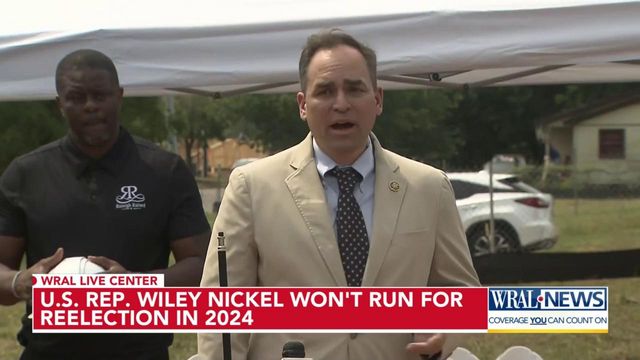U.S. Rep. Wiley Nickel won't run for reelection in 2024, turning attention to 2026 Senate race
U.S. Rep. Wiley Nickel, D-Cary, announced Thursday he won't seek reelection to his seat in the House of Representatives, which he won in 2022 in what was the only competitive House campaign anywhere in the state.
Nickel will instead begin an early campaign for the 2026 U.S. Senate election, when incumbent Sen. Thom Tillis, R-NC, will be up for reelection. He said he'll also put resources behind helping other Democrats win in 2024. Nickel isn't seeking reelection because, after the state legislature redrew the congressional maps ahead of the upcoming elections, Republican leaders turned his district from a competitive one to a solid Republican seat.
"Republicans have undercut our work for one reason: To consolidate their power, and to protect themselves and their special interest groups," Nickel said at a rally Thursday afternoon.
The GOP currently holds the majority in the U.S. House of Representatives by just two seats out of 435. So North Carolina's new maps could go a long way toward helping Republicans keep their majority in the 2024 elections, by flipping Nickel's and other Democrat-held seats.
"Wiley Nickel just gave Republicans an early Christmas gift with another pickup in the battle for the House majority," said Delanie Bomar, spokeswoman for the National Republican Congressional Committee, following his announcement Thursday that he won't seek reelection. "Democrats’ climb out of the minority is getting steeper every day.”
The 2022 elections led to an even 7-7 spit in North Carolina's 14 U.S. House seats under court-ordered maps drawn by experts. Most political observers had expected Republicans to win an 8-6 split last year. But Nickel pulled out a close victory over Bo Hines, a Donald Trump-endorsed candidate, in the 13th district that covered parts of Raleigh and the Wake County suburbs, as well as all of Johnston County and parts of Harnett and Wayne counties.
But the new maps, drawn by Republican legislative leaders, are expected to give Republicans at least a 10-4 advantage next year, and possibly 11-3.
With one day still left for candidates to file for the 2024 elections, already at least 12 Republicans have entered the primary to try replacing Nickel in Congress. Two of them — DeVan Barbour and Kelly Daughtry — finished second and third in the 2022 GOP primary, respectively. Whoever wins this year's Republican primary is likely to win the general election, too.
There's not necessarily a frontrunner yet, GOP insiders have told WRAL News — few of the contenders have any previous political experience, and none have held elected office before — but a number of them have already been hitting the campaign trail to try making a name for themselves.
In Nickel's district, the red shift was accomplished by getting rid of much of the Wake County territory and replacing it with half a dozen nearby rural counties, mostly along the Virginia border. Meanwhile, the heavily democratic areas of Wake County that had made Nickel's old district competitive were moved into the districts held by Rep. Deborah Ross, D-Raleigh, or Rep. Valerie Foushee, D-Hillsborough. Both women saw their districts move from heavily Democratic to overwhelmingly Democratic, something critics have called an obvious example of gerrymandering.
"They did it for one reason: To hold onto power no matter what voters want," Nickel said of Republican legislative leaders and their new maps. "Gerrymandering is destroying our democracy."
One of the main reasons Congress is so dysfunctional, Nickel said, is because only 10% of members are from competitive districts like his. The other 90% are in safe seats where the only thing they have to worry about is their party primary, and not what voters in general think. If elected to the Senate, he said he'd support ending the filibuster so Democrats could pass a nationwide anti-gerrymandering reform, as well as other priorities like new laws protecting voting rights and acting on climate change.
Nickel is the third Democrat from North Carolina's congressional delegation to not seek reelection this year, all of them blaming the new maps. The others are Rep. Kathy Manning, D-Greensboro, and Rep. Jeff Jackson, D-Charlotte. Manning said she hopes to return to Congress should the new maps be overturned in court; Jackson is running for attorney general to replace Josh Stein, a fellow Democrat who's running for governor to replace Democratic Gov. Roy Cooper, who is term-limited.
The new map also saw the district held by Rep. Don Davis, D-Snow Hill, turned from a slightly Democratic-leaning seat to a true tossup. Davis is seeking reelection and could again face off with Republican challenger Sandy Smith, who lost her 2020 and 2022 attempts to win other versions of that northeastern North Carolina district. Smith, who is popular with the far-right wing of the GOP, has previously been accused of domestic violence by her daughter and two of her ex-husbands, claims she denies. She has at least one challenger in the Republican primary, retired Army Col. Laurie Buckhout.
Democrats have sued, calling the maps unconstitutional due to racial gerrymandering, a claim Republicans have denied. Lawsuits are unlikely to stop the maps from being used in the 2024 elections, since they're now so close — candidate filing ends Friday and the primary election is in March — but legal challenges could feasibly block the maps in 2026 or later. The maps will be used in every election through 2030 unless struck down in court first.













